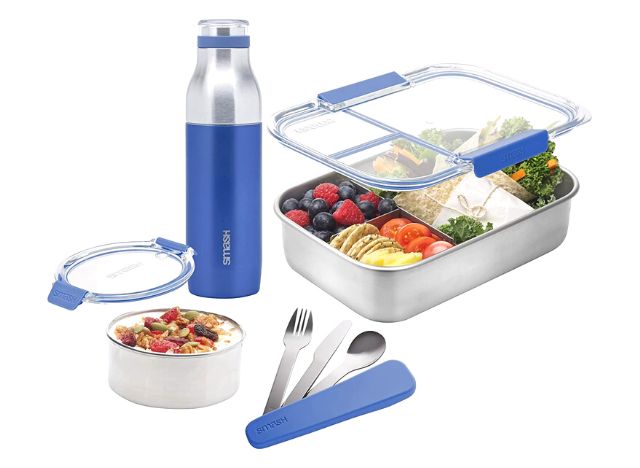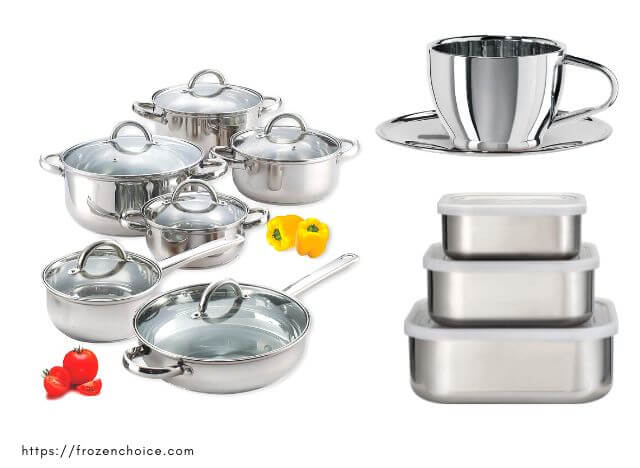Because of its long lifespan and resistance to both corrosion and rust, stainless steel is a common substance used in kitchen appliances and cookware. But when it comes to storing food, many people are uncertain whether stainless steel is suitable to use in refrigerators. In this blog article, we will find out if you can put stainless steel in the fridge. Let’s get started!
Can you put stainless steel in the fridge?
The answer is Yes. Food can be safely stored in stainless steel containers and put in fridge. In fact, stainless steel is used in the majority of gastro-norm containers that are used in professional kitchens.
This does not imply that they are “the best” – they are just as well suited to storage as many other kinds of containers. If you have specific requirements, you must determine what provides the best tradeoffs for your preferences. If you don’t, it makes no difference whether you use stainless steel or something else.
The preceding implies that your containers are inactive. This might involve stainless steel or surface-treated vessels. Naked blue steel will most likely combine with many foods, making it an unsuitable material. Blue steel that has been seasoned at home will respond to food as well, albeit more slowly than naked steel, so it’s utilized in pans rather than storage containers.
Further reading: Which Refrigerator is the Best for a Family with 4-5 Members?
Why should you store food in stainless steel?
Did you realize stainless steel has been around for over a century? In Sheffield, UK, the first stainless steel was developed in 1913. Stainless steels, as opposed to pure raw metals, combine metals like chromium, molybdenum, iron, and, in some cases, nickel.

Let’s consider the economic, health, and hygienic advantages of stainless steel in the section below:
Does not react to or leach from food
To begin with, SS is inert and neutral. That is, unlike plastic, they do not leach chemicals into your meals. Furthermore, rustless steel is impervious to smells and stains. Why? This is due to the non-porous nature of stainless steel. As a result, it is commonly used in expert kitchens and hospitals. Apart from plastic containers, rustless steel itself is inert to alkalis and acids generated by some of these foods and vegetables.
Locks maintain their freshness
Do you need a food storage case that can keep food fresh? Choose stainless steel with an airtight cover.
Because of its high thermal resistance, stainless steel even maintains heat. As a result, you can anticipate it to provide long-lasting hotness and coldness to your food. As a consequence, your food stays fresher for longer. Furthermore, SS can avoid food decay and waste.
You may also like: Can You Put a Stainless Steel Thermos in the Freezer?
Long-lasting and recyclable
Unlike glass or ceramic, stainless steel containers do not warp, shatter, or crack. Plastic materials, on the other hand, degrade with each cleaning. As a result, rustless steel is a low-maintenance substance for food storage.
While aluminum pits fast, stainless steel will last for years, saving you money down the road. Stainless steel, like aluminum, is entirely recyclable and reusable. To put this in context, 75% of SS products and metal tin cans manufactured a century ago continue to be used.
Safety
Another reason comes to choosing stainless steel over cast iron for safety is its resilience to rust and corrosion. The greatest part is that the SS coating repairs itself in oxygen.
Is it okay to keep food in stainless steel containers as well? Because stainless steel is anti-bacterial, it is safe to keep food in these containers. Furthermore, due to their smoothness, viruses cannot live on their surface for longer than a few hours.
Are they dishwasher-safe? Yes, stainless steel food containers are safe to use in dishwashers. However, you must first make sure the handles are safe as well.
See the benefits of stainless steel cookware:
What to consider in stainless steel containers to keep food safe in the fridge
There are a few important features to consider before purchasing stainless steel containers for storing food. The first is the stainless steel type. There is a reason why 304 is the most famous. It contains a solid blend of chromium and nickel.
The 316, on the other hand, is a great option. These qualities make it more durable and less scratch-resistant. This allows you to securely prepare items before storage while minimizing the risk of leaching.
Calphalon 10-Piece Pots and Pans Set
Next, when buying any sort of kitchen product, convenience is critical. Look for choices that are promoted as dishwasher, refrigerator, and freezer safe. It will qualify for all stainless steel food-grade goods.
If it is not mentioned, it is most likely not food grade. Finally, search for options that have BPA-free, airtight lids. The FineDine Premium Stainless-Steel Mixing Containers are an excellent option.
This collection of five 304-grade nesting bowls includes translucent HDPE plastic lids that match. This is exactly the same food-grade substance used to make your milk jug.
The JaceBox Stainless Steel Lunch Containers are ideal for dinner prep and food on the go for all those searching for a smaller choice. They are also made of 304 stainless steel and have snap-on, leak-proof covers.
What metal containers should not be kept in the refrigerator?
Poor quality aluminum or steel pans
Do not use poor quality steel or aluminum pans to store food in the refrigerator. These containers can rust when placed in the refrigerator and exposed to water. For sauces or food, it is better to transfer them to good quality stainless steel, porcelain or plastic containers.
Cast iron pan without coating
Cast iron pans can rust if left in the refrigerator and exposed to moisture for a long time. If your cast iron skillet has an internal coating, such as Le Creuset, these should be fine. You can refrigerate food for 1-2 days and it shouldn’t pose a problem.
You may also like: What are the Best Food Storage Containers for Fridge?
Disadvantages of stainless steel
It’s not Microwave safe. This is the main downside of stainless-steel products. If you want to reheat food, you must use another microwave-safe container.
Many types of foods will stick to surfaces when it is used for cooking. This is especially true of certain meats and cheeses.
It conducts heat inefficiently. It takes longer to heat up than other types of cookware. As a result, some companies use metals such as copper and aluminum to overcome this problem. These metals can leach into your food and may affect your health. You should purchase containers that do not have these ingredients.
It doesn’t react well to highly acidic foods including tomatoes, citrus fruits, vinegar-based sauces, seafood, and dairy products. When these items are cooked and stored in stainless steel containers, small amounts of contamination can occur resulting in changes in the color and taste of the food. Therefore, stainless steel containers are not ideal for preparing or storing dishes with many of these ingredients.
How to care for your stainless-steel containers
With proper care, your stainless-steel containers will last a lifetime. Here are the important steps to care for them.
- Before using them for the first time, you need to wash your containers with hot, soapy water
- To remove stubborn stains, you should use a mixture of baking soda and water
- Do not use chemicals or abrasive cleaners, as these substances can damage the finish of your containers
- Once your containers are clean and dry, store them in cool, dry places
- When not in use, just keep the lids off to allow air circulation and prevent moisture buildup
Conclusion
You can totally put your stainless steel containers in the refrigerator. Because of its resistance and durability, many fridges use stainless steel in their interiors to keep your food fresh longer. Remember to clean or wash it carefully before putting it into your refrigerator to minimize contamination.
Hope that the above article fully answers your questions about whether can you put stainless steel in the fridge.
FAQs
Is it safe to put stainless steel in the freezer?
Stainless steel is extremely resistant to cold. It is even advised for long-term storage for up to 12 months! Stainless steel can withstand extremely cold conditions. Lids with silicone seals are airtight, guaranteeing the airtightness of your stainless-steel container.
Can you put a hot stainless steel pan in the fridge?
Stainless steel would be unaffected, but aluminum and copper could leak into acidic foods, so keeping foods in them for extended periods, hot or cold, is not advised.
Do any foods react with stainless steel?
It is completely stable, and its constituent metals have no major reaction with or transfer to food. Stainless steel is indeed non-toxic and can be made into smooth, non-absorbent surfaces, tools, and utensils that can be washed, disinfected, and sanitized without danger of corrosion.
At what temperature does stainless steel weaken?
Grade 330 stainless steel can withstand temperatures of up to 2,000 degrees Fahrenheit because of its chromium and nickel composition. However, for the longest lifetime, grade 330 alloys should only be exposed to a higher heat of 1,900 degrees Fahrenheit.
Reference
Are Stainless Steel Containers Safe for Food Storage, stainlesssteelguide.com, Retrieved on Apr. 28, 2023
Is It Safe To Keep Food In Stainless Steel Containers, smarterhomemaker.com, Retrieved on Apr. 28, 2023



